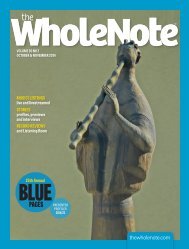Volume 25 Issue 7 - April 2020
After some doubt that we would be allowed to go to press, in respect to wide-ranging Ontario business closures relating to COVID-19, The WholeNote magazine for April 2020 is now on press, and print distribution – modified to respect community-wide closures and the need for appropriate distancing – starts Monday March 30. Meanwhile the full magazine is right here, digitally, so if you value us PLEASE SHARE THIS LINK AS WIDELY AS YOU CAN. It's the safest way for us to reach the widest possible audience at this time!
After some doubt that we would be allowed to go to press, in respect to wide-ranging Ontario business closures relating to COVID-19, The WholeNote magazine for April 2020 is now on press, and print distribution – modified to respect community-wide closures and the need for appropriate distancing – starts Monday March 30. Meanwhile the full magazine is right here, digitally, so if you value us PLEASE SHARE THIS LINK AS WIDELY AS YOU CAN. It's the safest way for us to reach the widest possible audience at this time!
You also want an ePaper? Increase the reach of your titles
YUMPU automatically turns print PDFs into web optimized ePapers that Google loves.
dozen pieces from such luminaries as Norma Beecroft, Francis<br />
Dhomont, Yves Daoust and Paul Dolden, along with the abovementioned<br />
Jaeger and another current WholeNote colleague Wendalyn<br />
Bartley.<br />
Although in recent years my interest in the<br />
form has waned, the most recent release<br />
from Toronto cellist/composer/producer<br />
Nick Storring has brought fond memories<br />
of my earlier involvement with the medium.<br />
The nostalgia I feel is not just the reminder<br />
of the many ways that electronic media can<br />
be used to convey personal expression, but<br />
also the variety of programming across the<br />
board at CKLN. Storring’s My Magic Dreams Have Lost Their Spell<br />
(orangemilkrecords.bandcamp.com) is described as a “heartfelt,<br />
albeit oblique, homage to Roberta Flack” who, Storring goes on to say,<br />
“in addition to managing profound emotion and consummate musicality<br />
as a vocalist, has a brilliant curatorial mind. She brings together<br />
songs into smart and beautiful arcs and assembles artists to adorn<br />
these songs with powerful production choices and arrangements.”<br />
Oblique as it is, I’m not sure I would have recognized this as a tribute<br />
to the powerful pop icon without the artist’s statement contained in<br />
the press release.<br />
Storring’s latest, and his first release on vinyl (though I’m working<br />
from digital files), is a multi-faceted creature divided into six movements<br />
ranging from about five to ten minutes in length. The overall<br />
feel is gentle and tonal, although there are many different moods.<br />
Tides That Defeat Identity is a kind of synthetic aural sunrise which<br />
begins with barely audible cello scrubbing and develops through<br />
many layers in which a number of acoustic instruments can be<br />
discerned in various forms of electronic disguise. After a couple more<br />
dreamlike tracks What A Made-Up Mind Can Do builds gradually to a<br />
tumultuous clatter that gradually gives way to a Morse Code-like interlude<br />
followed by some funky bass licks with Latin beats, electric piano<br />
and psychedelic guitar that in turn recede into the mist via some<br />
gamelan-like percussion. To my ear, the title track is most reminiscent<br />
of Roberta Flack. The opening electric piano arpeggio immediately<br />
reminded me of one of her megahits, Killing Me Softly with<br />
His Song, and there I have a personal connection as well. I attended<br />
an Eric Andersen show at the Riverboat in 1974, the year after the<br />
release of Flack’s hit, and was surprised to find that the opening act,<br />
Lori Lieberman, had “written” the song. I remember that several times<br />
during his set Andersen snickered (or maybe just grinned), hummed<br />
a bar or two of Killing Me and said “I wish I’d written that…” At any<br />
rate, isn’t the internet a wonderful resource? I just Googled and was<br />
informed that Charles Fox and Norman Gimbel, Lieberman’s agents,<br />
actually wrote the song “in collaboration with Lori Lieberman.”<br />
There’s much more juicy info in the entry if you’re interested in<br />
some sordid details. At any rate, until Storring’s wonderful tribute<br />
to the (still active at 83) songstress, that was my main connection<br />
with Roberta Flack. And don’t let my talk about nostalgia lead you to<br />
believe that My Magic Dreams Have Lost Their Spell is an anachronistic<br />
throwback. It’s a carefully crafted and very effective eclectic<br />
post-modern creation. Give it a spin on your turntable, or your digital<br />
media provider, or wait for the CD release which I understand is<br />
imminent.<br />
My years as a volunteer at CKLN-FM garnered me the experience to<br />
land what I sometimes consider to have been the “best” job of my<br />
life, five years as a music programmer at CJRT-FM (especially now<br />
that I’m benefitting from a modest Ryerson University pension).<br />
Reconstructed as JAZZ-FM in 2001, the Ryerson station had been a<br />
multi-format broadcaster since its inception in 1949 and during the<br />
five years I worked there (1993-1998) the programming included classical<br />
music, opera, jazz, folk and blues shows, live concert recordings<br />
(jazz and classical), BBC variety programs and an assortment of<br />
academic courses under the auspices of Open College Ryerson. I had<br />
the great pleasure of selecting the music for Alex Baran’s Music for<br />
Midday, recording – with engineer William van Ree – and scripting<br />
CJRT Concert, selecting the music for Peter Keigh’s Music Before 1800,<br />
interviewing such celebrities as Ben Heppner for This Week in Music<br />
and producing Canadian Currents, 52 hour-long programs celebrating<br />
the concert music of our native land. This last notwithstanding<br />
– it was funded by a grant from Joan Chalmers through the Canadian<br />
Music Centre – the music I was “allowed” to program was for the most<br />
part not contemporary and certainly not “challenging.” After all, the<br />
publicly funded station existed thanks to the generosity of its listeners,<br />
who for the most part enjoyed “traditional” fare. It was during my<br />
tenure there that the Symphony of Sorrowful Songs swept the classical<br />
world, including the august halls of CJRT. In 1992 the London<br />
Sinfonietta, under David Zinman with soloist Dawn Upshaw, recorded<br />
Henryk Górecki’s 1976 Symphony No.3 with that now-famous<br />
subtitle. To date, the Nonesuch recording has sold more than a million<br />
copies, something unheard of for a contemporary classical recording.<br />
I find it somewhat surprising to note that the three string quartets<br />
by this, until then, obscure Polish composer, were all commissioned<br />
by the American Kronos Quartet, and that two of them predate the<br />
release of the chart-topping symphony that brought him world fame.<br />
Another instance of the foresight of this adventuresome group.<br />
They have been newly recorded by Quatuor Molinari for ATMA on<br />
Henryk Górecki Complete String Quartets (ACD2 2802<br />
atmaclassique.com). Although there are some quiet and contemplative<br />
moments, particularly in the opening of the second quartet with<br />
its extremely dark viola melody, anyone looking for a reprise of the<br />
beauty of the “sorrowful songs” will likely be disappointed. At times<br />
What we're listening to this month:<br />
thewholenote.com/listening<br />
Something More<br />
Lynn Harrison<br />
Songs that delve deep into love, life<br />
and the human spirit.<br />
“I knew instantly Lynn was a<br />
special artist.” (John Apice,<br />
“Americana Highways”)<br />
Homage and Inspiration<br />
Iris Trio<br />
Masterworks by Schumann and<br />
Mozart are paired with modern<br />
tributes by György Kurtág and<br />
Christof Weiss, for an exquisite and<br />
stimulating musical conversation.<br />
Un Vélo, une Auto, un Boulevard et<br />
de la Neige<br />
Louis-Philippe Bonin<br />
Louis-Philippe Bonin deploys his<br />
virtuoso saxophone talents in a new<br />
recording of 20th-century repertoire<br />
including two contemporary works by<br />
Kristin Kuster and Félix-Antoine Coutu.<br />
Modulation Necklace<br />
Movses Pogossian<br />
This captivating album is a<br />
snapshot of the vibrant community<br />
of post--Soviet Armenian<br />
composers, performed with<br />
commitment and sensitivity by LA<br />
based musicians.<br />
thewholenote.com <strong>April</strong> <strong>2020</strong> | 49


















